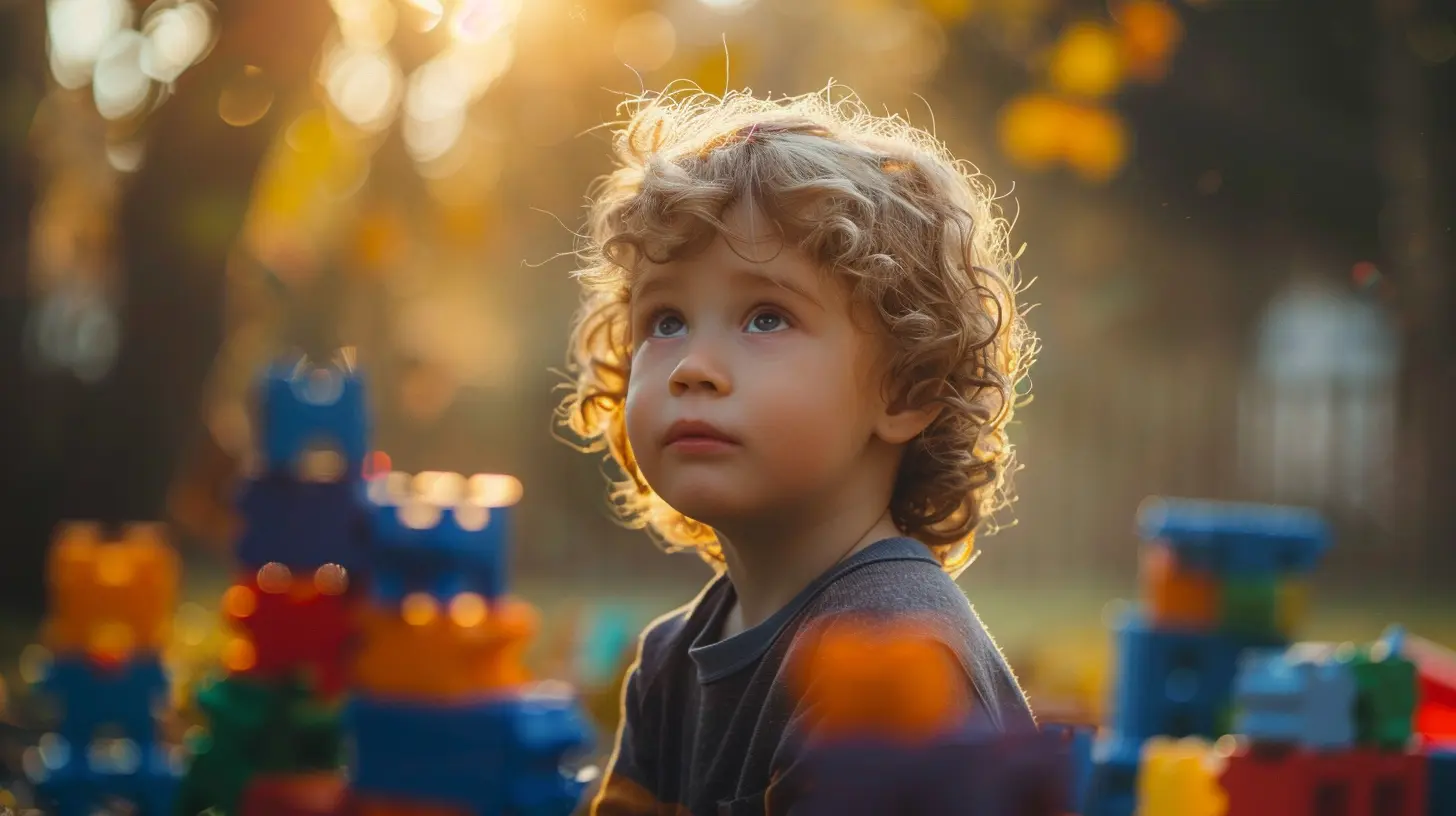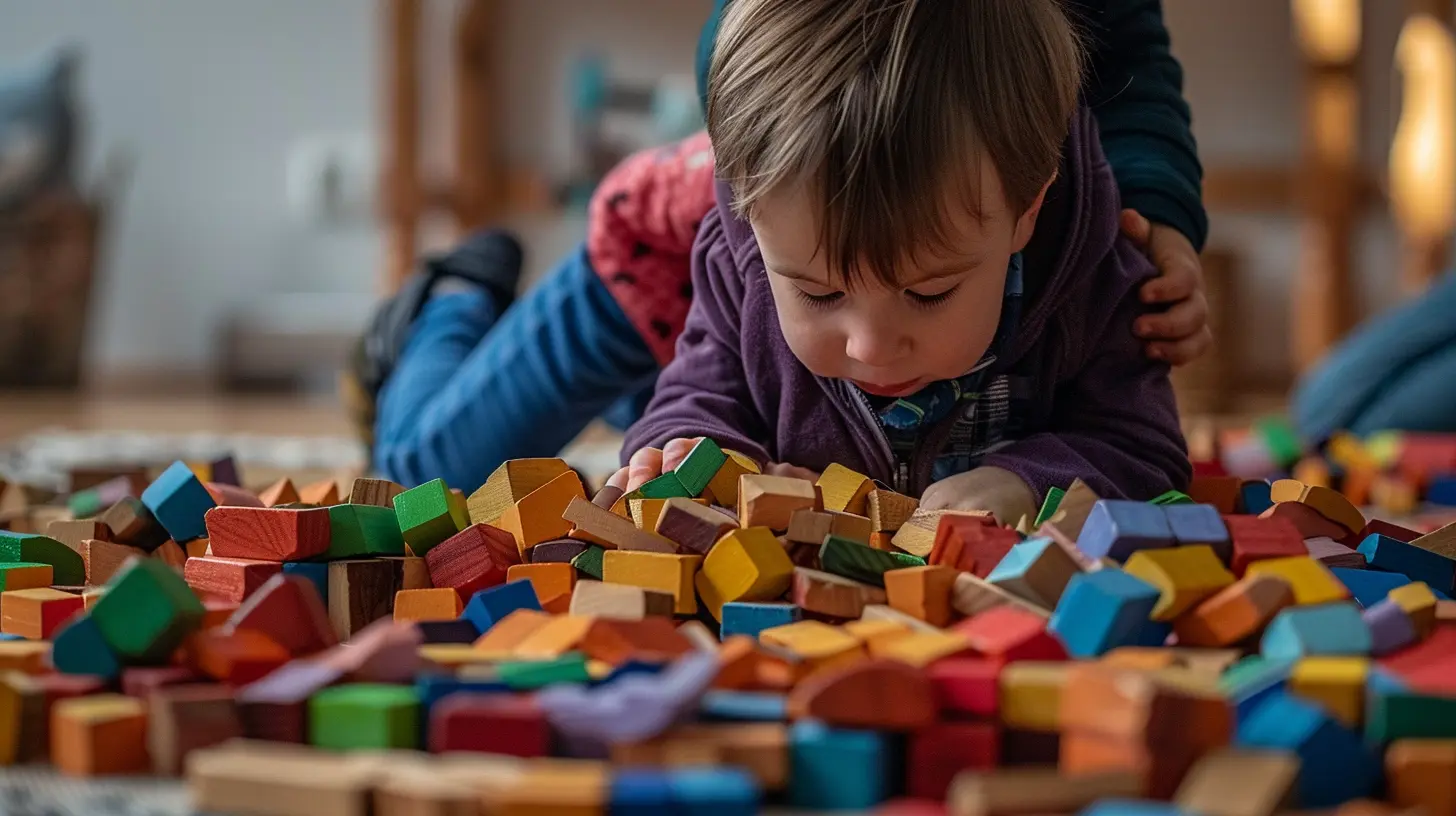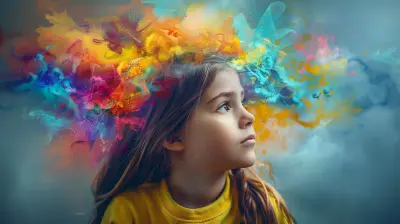The Role of Play Therapy in Child Counseling
22 December 2024
When it comes to helping children navigate the challenges they face, traditional talk therapy isn't always the best approach. Kids, especially younger ones, don't always have the vocabulary or emotional maturity to express what they're going through. They may not even fully understand their own feelings. So, what’s the alternative? One increasingly popular method is play therapy. This therapeutic approach allows children to express themselves in a way that feels natural to them—through play. But what exactly is play therapy, and how does it fit into child counseling?
In this article, we’re going to dive deep into the world of play therapy, exploring how it works, why it’s so effective, and how it supports children in overcoming emotional and psychological challenges. Let’s get started!

What Is Play Therapy?
Okay, so before we get into the nitty-gritty of how play therapy works, let's define it. Play therapy is a form of counseling or psychotherapy where play is used as a medium for communication between the therapist and the child. This type of therapy is particularly useful for children aged 3 to 12, though it can be adapted for older kids and even adults.In essence, play therapy allows children to use toys, games, and creative activities to express their feelings, thoughts, and experiences. It’s not just about having fun (though that’s part of it!). It’s about using play as a tool for healing, self-expression, and problem-solving. Imagine it like this: where adults might vent to a therapist about their problems, kids use their play to "talk" about theirs.
Why Play?
Children are naturally wired to play. It's how they learn about the world, how they make sense of their experiences, and how they express their emotions. Just as adults might use words to communicate their feelings, kids use play. Ever noticed how a child might act out a fight they saw at home using their stuffed animals? That’s their way of processing what happened.In the context of therapy, play becomes an avenue for children to explore their emotions and experiences in a safe and supported environment. The therapist observes and interacts with the child during play sessions, helping them work through emotional struggles that might be too overwhelming or complex to verbalize.

The Benefits of Play Therapy
So, why is play therapy so effective? What makes it stand out as a tool in child counseling? Let’s dive into some of the key benefits.1. Facilitates Emotional Expression
As mentioned earlier, children often struggle to articulate their feelings. They might know they’re sad, angry, or scared, but they don’t always know how to explain why. Play therapy gives them a way to "talk" without actually talking.For instance, a child who’s feeling anxious might repeatedly build walls with blocks during a session. This could symbolize their desire to protect themselves or keep others at a distance. A skilled therapist can help the child explore these patterns and guide them toward understanding their emotions.
2. Promotes Problem-Solving Skills
Play therapy often involves role-playing, decision-making, and imaginative scenarios that encourage problem-solving skills. For example, a child might act out a situation where they’re facing a "villain" or obstacle. Through play, they can experiment with different solutions, building up their confidence and resilience in the process.3. Enhances Communication
In play therapy, the child is the leader, and the therapist follows their cue. This dynamic empowers the child to communicate in a way that feels natural to them. Over time, children often become more comfortable expressing their feelings, which can lead to improved communication outside of therapy as well—whether it's with parents, teachers, or peers.4. Builds Trust and Rapport
One of the most significant challenges in any form of therapy is building trust between the therapist and the client. With children, this can be even more difficult. However, play therapy creates a non-threatening environment where children can feel safe and understood. The act of playing together fosters a sense of connection and trust, which is essential for effective therapy.5. Helps Process Trauma
Children who have experienced trauma—whether it’s abuse, neglect, or the loss of a loved one—often struggle to process these events. Play therapy provides them with a safe space to explore their feelings and begin the healing process. For example, a child who has witnessed domestic violence might use dolls to reenact what they saw, giving the therapist insight into their emotional state.6. Encourages Emotional Regulation
Kids can have a hard time regulating their emotions, especially when they’re dealing with big feelings like anger, sadness, or fear. Play therapy helps them practice managing these emotions in a controlled environment. Through play, they can learn healthy coping mechanisms and emotional regulation strategies that they can apply in real life.
How Play Therapy Works
Now, let’s get into how play therapy is actually conducted. It’s not just about sitting a child down with a bunch of toys and hoping for the best. There’s a structure and methodology behind it.1. The Initial Assessment
Before play therapy begins, the therapist will typically conduct an initial assessment. This involves talking to the child’s parents or caregivers to gather background information and understand the child’s specific needs. The therapist might also observe the child to get a sense of their behavior and emotional state.2. Creating a Safe Environment
One of the core principles of play therapy is creating a safe, supportive environment where the child feels comfortable expressing themselves. The therapy room is often filled with a variety of toys, art supplies, and games that are carefully chosen to encourage self-expression. This isn’t just a random collection of toys—it’s a therapeutic tool kit!3. Directive vs. Non-Directive Play Therapy
There are two main types of play therapy: directive and non-directive.- Directive Play Therapy: In this approach, the therapist takes a more active role, guiding the child’s play in a specific direction. For example, the therapist might ask the child to act out a particular scenario or use a specific toy to explore a topic.
- Non-Directive Play Therapy: Here, the child is in charge. The therapist allows the child to lead the session, choosing whatever toys or activities they’re drawn to. The therapist observes and offers support but doesn’t interfere unless necessary. Non-directive play therapy is based on the belief that children are naturally inclined to work through their issues if given the space to do so.
4. The Therapeutic Process
During the play sessions, the therapist closely observes the child’s behavior, choices, and interactions with the toys. They may ask open-ended questions or offer gentle prompts to help the child explore their emotions and thoughts. Over time, the therapist and child develop a rapport, and the child begins to feel more comfortable expressing themselves.5. Parental Involvement
Parents or caregivers often play a role in the therapeutic process. After all, they’re the ones who spend the most time with the child. The therapist might offer guidance on how parents can support their child’s emotional development at home, and in some cases, parents may be invited to participate in the sessions.
Common Issues Addressed Through Play Therapy
Play therapy can be used to address a wide variety of emotional, behavioral, and psychological issues in children. Some of the most common include:- Anxiety and stress: Children who struggle with anxiety may use play therapy to explore the root causes of their worries and develop coping strategies.
- Behavioral problems: Play therapy can help children understand and manage challenging behaviors like aggression, defiance, or hyperactivity.
- Trauma: As we mentioned earlier, play therapy is particularly effective for children who have experienced trauma, allowing them to process their experiences in a safe, controlled environment.
- Grief and loss: Children who have experienced the death of a loved one or other forms of significant loss can use play therapy to work through their grief.
- Social difficulties: Some children struggle with making friends or navigating social situations. Play therapy can help them develop better social skills and improve their relationships with peers.
Does Play Therapy Really Work?
You might be wondering, “Does this actually help?” The short answer is: yes! Numerous studies have shown that play therapy can be highly effective in helping children manage emotional and behavioral challenges. It’s particularly beneficial for younger children who may not be able to engage in traditional talk therapy.Of course, like any form of therapy, the effectiveness of play therapy depends on various factors, including the child’s specific needs, the therapist’s skill level, and the involvement of the parents or caregivers. But overall, play therapy has been shown to improve emotional well-being, enhance communication, and promote healthy development.
Conclusion: Play Is More Than Just Fun
In child counseling, play therapy offers a unique and powerful way for kids to express themselves, work through their emotions, and develop essential life skills. By meeting children where they are—in the world of play—therapists can help them heal and grow in ways that feel natural and comfortable.So, the next time you see a child building with blocks, painting a picture, or acting out a story with their dolls, remember: they could very well be working through something big. Play is serious business when it comes to emotional health, and play therapy is a vital tool in the world of child counseling.
all images in this post were generated using AI tools
Category:
Psychological CounselingAuthor:

Matilda Whitley
Discussion
rate this article
13 comments
Landon Sawyer
Play therapy: where tiny couches and stuffed animals become the ultimate therapists! Who knew that a rubber chicken could unlock the emotional depths of a child's psyche? Talk about putting the 'fun' in functional mental health! 🐥🛋️
February 2, 2025 at 5:50 PM

Matilda Whitley
Absolutely! Play therapy creatively taps into children's natural language of play, allowing them to express emotions and experiences through imaginative scenarios. It's a powerful tool in nurturing mental health! 🧸✨
Quinn Sawyer
Play therapy: where kids can express their feelings while dodging imaginary monsters and negotiating snack breaks. Who knew counseling could be this fun? Time to bring out the crayons and creativity!
January 30, 2025 at 5:48 PM

Matilda Whitley
Absolutely! Play therapy creatively combines fun and healing, allowing kids to express emotions and engage in meaningful ways while navigating their challenges. It's a powerful tool for growth and connection!
Zaid McMeekin
Play therapy ignites healing and growth, transforming children's lives through imagination!
January 28, 2025 at 3:22 AM

Matilda Whitley
Thank you! I agree—play therapy truly harnesses the power of imagination to foster healing and growth in children.
Landon Warren
Play therapy serves as a vital tool in child counseling, allowing children to express emotions and experiences they may struggle to articulate verbally. By utilizing play as a medium, therapists can foster a safe environment for healing, ultimately enhancing emotional regulation and interpersonal skills, which are crucial for healthy development.
January 23, 2025 at 4:16 PM

Matilda Whitley
Thank you for highlighting the importance of play therapy! It truly is an essential tool for helping children express themselves and develop vital emotional skills in a safe environment.
Thalor Pacheco
Delve into the hidden realms of a child's mind—where play unveils unspoken fears and desires. Discover how play therapy transforms whispers into healing in child counseling.
January 19, 2025 at 5:28 AM

Matilda Whitley
Thank you for highlighting the profound impact of play therapy! It truly reveals the inner world of children, helping them express and heal through creative exploration.
Geneva Riley
Play therapy: healing through joyful expression!
January 16, 2025 at 4:07 AM

Matilda Whitley
Absolutely! Play therapy harnesses the power of joyful expression to facilitate healing and emotional growth in children.
Shannon Morales
This article wonderfully captures the essence of play therapy in child counseling. It highlights the importance of integrating play to foster communication and healing, making it a vital tool for therapists working with children. Great insights!
January 7, 2025 at 3:56 PM

Matilda Whitley
Thank you for your kind words! I'm glad you found the article insightful and valuable for understanding the role of play therapy in child counseling.
Reese Beck
Play therapy offers children a vital way to express emotions.
January 2, 2025 at 3:33 AM

Matilda Whitley
Thank you for your insightful comment! Indeed, play therapy is a crucial tool for helping children articulate their feelings in a safe and supportive environment.
Clarissa McTiernan
This article beautifully highlights the transformative power of play therapy in child counseling. It's inspiring to see how such a simple act can foster healing and growth in young minds. Thank you for sharing!
December 26, 2024 at 5:56 AM

Matilda Whitley
Thank you for your thoughtful comment! I'm glad you found the article inspiring and appreciate the power of play therapy in fostering healing in children.
Noah Miller
Thank you for highlighting the importance of play therapy in child counseling. It's heartening to see how this approach nurtures emotional expression and healing, offering children a safe space to navigate their feelings and experiences.
December 25, 2024 at 4:46 PM

Matilda Whitley
Thank you for your kind words! I'm glad the article resonated with you and emphasizes the vital role of play therapy in supporting children's emotional well-being.
Hattie Myers
This article raises fascinating insights into how play therapy can unlock children's emotions and foster healing. I wonder how different types of play influence various psychological outcomes. Are there specific play techniques that work better for certain issues? I'd love to see more examples of successful case studies in future posts!
December 25, 2024 at 5:48 AM

Matilda Whitley
Thank you for your thoughtful comment! Different play techniques can indeed influence psychological outcomes, and we'll definitely consider including specific case studies and examples in future posts to illustrate these insights. Stay tuned!
Valeria Middleton
Play therapy offers children a safe space to express emotions and experiences, fostering healing and growth through creative exploration, ultimately bridging the gap between feelings and understanding.
December 23, 2024 at 5:53 AM

Matilda Whitley
Thank you for highlighting the transformative power of play therapy! It truly provides a vital outlet for children to process their emotions and experiences in a safe environment.
Chantal McKale
Play therapy fosters healing and connection, vital for children's emotional growth.
December 22, 2024 at 4:21 PM

Matilda Whitley
Thank you! Play therapy indeed plays a crucial role in supporting children's emotional development by encouraging healing and fostering meaningful connections.
MORE POSTS

The Power of Defaults: How Small Nudges Influence Big Choices

How Daily Habits Can Boost Your Emotional Resilience

How to Use Emotional Intelligence to Set Healthy Boundaries

Dealing with Anxiety in Times of Uncertainty

The Fundamental Attribution Error: Misjudging Situations and Personalities

Fear of Public Speaking: Why Glossophobia Is So Common

How to Set Realistic Goals in Therapy

How to Develop Coping Skills in Children and Adolescents

The Curse of Knowledge: How Expertise Can Make Communication Difficult